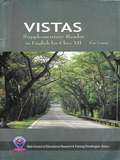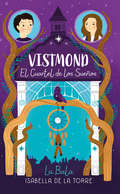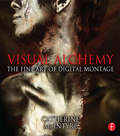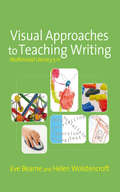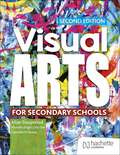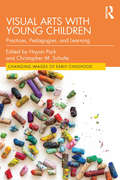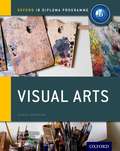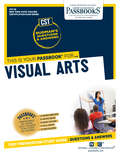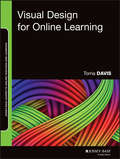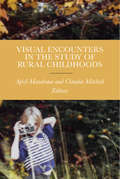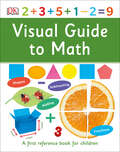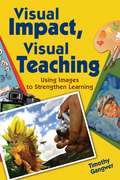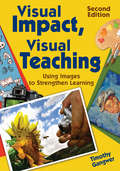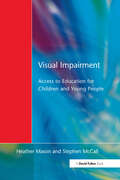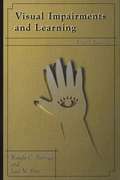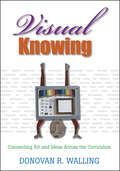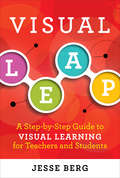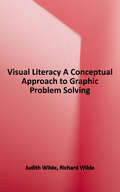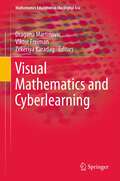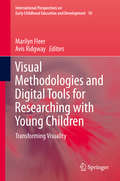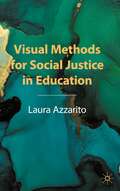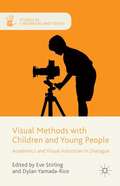- Table View
- List View
Vistas Supplementary Reader (Core Course) class 12 - S.C.E.R.T Raipur - Chhattisgarh Board
by Raipur C. G. Rajya Shaikshik Anusandhan Aur Prashikshan ParishadThis book prescribed by central board of secondary education, India for the students of class 12th subject English. This accessible version of the book doesn't leave any part of the book. The book is handy companion of the school going students.
Vistmond. El cuartel de los sueños
by La BalaEsta es la historia de Yael, quien al cumplir trece años recibe un misterioso regalo. Junto a sus amigos Diego y María tendrá que descubrir el contenido y la misión que la acompaña. Una historia llena de aventuras, misterio y un mundo por conocer Tras resignarse a conservar un atrapasueños que no deja de perseguirlo, Yael cae abruptamente en otra dimensión: es el fantástico mundo de Vistmond. Aún no sabe que tiene una misión importante y que el atrapasueños será su guía. Sus dos mejores amigos, Diego y María, por diversas razones, llegarán también a este fabuloso lugar, donde conocerán a maestros de diversas artes, gigantes, enanos y otros grandiosos personajes que les enseñarán el valor de los sueños. Vistmond. El cuartel de los sueños es la primera novela de Isabela de la Torre, mejor conocida en redes sociales como La Bala. La vivacidad y el estilo que la caracterizan quedan plasmados en esta intensa novela de aventuras.
Vistmond. El cuartel de los sueños
by La BalaEsta es la historia de Yael, quien al cumplir trece años recibe un misterioso regalo. Junto a sus amigos Diego y María tendrá que descubrir el contenido y la misión que la acompaña. Una historia llena de aventuras, misterio y un mundo por conocer Tras resignarse a conservar un atrapasueños que no deja de perseguirlo, Yael cae abruptamente en otra dimensión: es el fantástico mundo de Vistmond. Aún no sabe que tiene una misión importante y que el atrapasueños será su guía. Sus dos mejores amigos, Diego y María, por diversas razones, llegarán también a este fabuloso lugar, donde conocerán a maestros de diversas artes, gigantes, enanos y otros grandiosos personajes que les enseñarán el valor de los sueños. Vistmond. El cuartel de los sueños es la primera novela de Isabela de la Torre, mejor conocida en redes sociales como La Bala. La vivacidad y el estilo que la caracterizan quedan plasmados en esta intensa novela de aventuras.
Visual Alchemy: The Fine Art Of Digital Montage
by Catherine McIntyreCatherine McIntyre, like many fine artists, created traditional art for decades before encountering the versatility of digital imaging technology. Free of her Rotring pens and scalpel, she now uses Photoshop to create her montages. Visual Alchemy explores McIntyre’s sources of inspiration as well as her methods, offering an aesthetic guide to composition, color, texture and all of the other means of communication that artists have at their disposal. While these concepts and techniques make use of Photoshop, they will apply to any digital imaging program and indeed to any medium, whether traditional or digital. Featuring McIntyre’s own art as well as that of artists around the globe, Visual Alchemy is an invitation to discover the artistic possibilities of picture making through digital montage.
Visual Approaches to Teaching Writing: Multimodal Literacy 5 - 11 (Published in association with the UKLA)
by Helen Wolstencroft Ms Eve BearneIncludes CD-Rom Why are visual approaches to literacy important? Children's experience of texts is no longer limited to words on printed pages - their reading and writing worlds are formed in multimodal ways, combining different modes of communication, including speech or sound, still or moving images, writing and gesture. This book is a practical guide for teachers in making sense of multimodal approaches to teaching writing. The book covers topics such as: - The design of multimodal texts and the relationships between texts and images - How to build a supportive classroom environment for analysing visual and audiovisual texts, and how to teach about reading images - How to plan a teaching sequence leading to specific writing outcomes - Examples of teaching sequences for developing work on narrative, non-fiction and poetry - Formative and summative assessment of multimodal texts, providing levels for judging pupil development, and suggestions for moving pupils forward - How to write, review and carry out a whole school policy for teaching multimodal writing The book is accompanied by a CD, which contains a range of examples of children's multimodal work, along with electronic versions of the activities and photocopiable sheets from the book, and material designed for use with interactive whiteboards. It will be a valuable resource for primary teachers, literacy co-ordinators and students on initial teacher training courses. Visit the UKLA's website : here
Visual Arts for Secondary Schools Second Edition
by Allan Sieupresad Michelle Bright Chin-See Gabriella D’AbreauConfidently navigate the Visual Arts curricula across all secondary school years with a course that unifies foundational skills and CSEC exam practice, featuring clear visual guides and activities tailored for academic success and artistic growth.- Enhance CSEC readiness with a resource that incorporates the latest technologies and syllabus topics, guiding students through reflective journal and portfolio creation for exam success. - Foster accessible learning through the simplification of complex visual arts concepts with student-friendly language and step-by-step guidance, enhancing skill development across student levels. - Improve understanding of chapter content through practical skills and preparation for examination with research-based activities, collaborative and independent projects, and art appreciation or critique.
Visual Arts for Secondary Schools Second Edition
by Allan Sieupresad Michelle Bright Chin-See Gabriella D’AbreauConfidently navigate the Visual Arts curricula across all secondary school years with a course that unifies foundational skills and CSEC exam practice, featuring clear visual guides and activities tailored for academic success and artistic growth.- Enhance CSEC readiness with a resource that incorporates the latest technologies and syllabus topics, guiding students through reflective journal and portfolio creation for exam success. - Foster accessible learning through the simplification of complex visual arts concepts with student-friendly language and step-by-step guidance, enhancing skill development across student levels. - Improve understanding of chapter content through practical skills and preparation for examination with research-based activities, collaborative and independent projects, and art appreciation or critique.
Visual Arts with Young Children: Practices, Pedagogies, and Learning (Changing Images of Early Childhood)
by Christopher M. Schulte Hayon ParkFeaturing the work of leading scholar-practitioners, Visual Arts with Young Children raises critical questions about the situated nature of the visual arts and its education in early childhood. Innovative chapters explore the relationship of place to art practice and pedagogy, culturally-responsive and justice-oriented perspectives, as well as critical and reconceptualist approaches to materials, technology and media. Ideal for researchers and students of both early childhood education and arts integration programs, this volume is an essential step towards a deeper understanding of how visual arts are understood, valued and practiced in the early years.
Visual Arts: Course Companion (Oxford IB Diploma Programme)
by Andrew Vaughan Jayson Paterson Simon PoppyStrengthen potential in IB Visual Arts. The only resource matched to the IB Visual Arts Guide, this essential Course Book breaks down and clarifies all the assessment components of the course. Guiding learners through each assessment task, a range of artwork examples contextualize the exam criteria, reinforcing comprehension and confidence. Build assessment potential enable learners to fully understand and engage with all the assessment tasks Develop exam strategies equip students with tested means to develop ideas and evaluate their work Drive reflective learning built-in TOK links, questions and discussion points help you fully adopt the IB approach to learning Fully matched to the most recent IB Visual Guide for first examination 2016.
Visual Arts: Passbooks Study Guide (New York State Teacher Certification Examination Series (NYSTCE))
by National Learning CorporationThe New York State Teacher Certification Exams (NYSTCE) are required for all candidates seeking licensure in the State. The NYSTCE series consists of many different tests assessing skills and abilities necessary for teachers. The Passbook® for the Content Specialty Test in Visual Arts provides hundreds of multiple-choice questions in the areas that will likely be covered on your upcoming certification exam, including but not limited to: tools, materials and techniques related to drawing, painting, photography, sculpture and architecture; principles of design; culture and history; and other related areas.
Visual Design Solutions: Principles and Creative Inspiration for Learning Professionals
by Connie MalamedEnhance learners' interest and understanding with visual design for instructional and information products No matter what medium you use to deliver content, if the visual design fails, the experience falls flat. Meaningful graphics and a compelling visual design supercharge instruction, training, and presentations, but this isn't easy to accomplish. Now you can conquer your design fears and knowledge gaps with Visual Design Solutions: a resource for learning professionals seeking to raise the bar on their graphics and visual design skills. This informal and friendly book guides you through the process and principles used by professional graphic designers. It also presents creative solutions and examples that you can start using right away. Anyone who envisions, designs, or creates instructional or informational graphics will benefit from the design strategies laid out in this comprehensive resource. Written by Connie Malamed, an art educator and instructional designer, this book will help you tap into your creativity, design with intention, and produce polished work. Whereas most graphic design books focus on logos, packaging, and brochures, Visual Design Solutions focuses on eLearning, presentations, and performance support. Visual Design Solutions includes practical guidelines for making smart design choices, ways to create professional-looking products, and principles for successful graphics that facilitate learning. Ideal for instructional designers, trainers, presenters, and professors who want to advance from haphazard to intentional design, this book will help them realize their design potential. Gain the knowledge and confidence to design impressive, effective visuals for learning Increase learner comprehension and retention with visual strategies offered by an expert author Serves as a reference and a resource, with a wealth of examples for inspiration and ideas Addresses an intimidating topic in an informal, friendly style In four parts, the book provides a thorough overview of the design process and design concepts; explores space, image, and typography; and presents workable solutions for your most persistent and puzzling design problems. Get started and begin creating captivating graphics for your learners.
Visual Design for Online Learning
by Torria DavisUpdate the visual design of your course in pedagogically sound ways Visual Design for Online Learning spotlights the role that visual elements play in the online learning environment. Written for both new and experienced instructors, the book guides you in adding pedagogically relevant visual design elements that contribute to effective learning practices. The text builds upon three conceptual frameworks: active learning, multiple intelligences, and universal design for learning. This resource explores critical issues such as copyright, technology tools, and accessibility and includes examples from top Blackboard practitioners which are applicable to any LMS. Ultimately, the author guides you in developing effective visual elements that will support your teaching goals while reinforcing the learning materials you share with your students. There has been a steady increase of over 10% in online enrollment for higher education institutions since 2002, yet the visual look of online courses has not changed significantly in the last ten years. Adapting to the needs of students within online classes is critical to guiding your students toward success--and the right visual elements can play an integral role in your students' ability to learn and retain the information they need to thrive in their chosen programs. In fact, visual elements have been shown to increase student participation, engagement, and success in an online course. Leverage the best practices employed by exemplary Blackboard practitioners Explore three foundational conceptual frameworks: active learning, multiple intelligences, and universal design for learning Increase student retention and success Visual Design for Online Learning is an essential reference for all online educators--both new and experienced.
Visual Encounters in the Study of Rural Childhoods
by Claudia Mitchell Eric Gottesman Naydene De Lange Relebohile Moletsane April Mandrona Bernard Chan Karren Eppley Wendy Ewald Sally Campbell Galman Diana Carolina Gomez Helle Stranfaard Jensen Renee Jackson Rahul Kamble Irina Kosterina Jonathan Kremser Barbara Turk Niskac Sara Nyhlen Katarina Gritli Nygren Katja Gillander-Gadin Eva Soderberg Kelly Royds Beth Shively Jennifer Vanderburgh Sheilah Wilson Holley WlodarczykVisual Encounters in the Study of Rural Childhoods brings together visual studies and childhood studies to explore images of childhood in the study of rurality and rural life. The volume highlights how the voices of children themselves remain central to investigations of rural childhoods. Contributions look at representations and experiences of rural childhoods from both the Global North and Global South (including U.S., Canada, Haiti, India, Sweden, Slovenia, South Africa, Russia, Timor-Leste, and Colombia) and consider visuals ranging from picture books to cell phone video to television.
Visual Guide to Math (DK First Reference)
by DKKey math vocabulary and concepts for young children explained simply in this friendly and informative reference book.Clear, accessible pictures and diagrams support this first introduction to numbers, calculating, measuring, geometry, and data-collecting, making basic maths skills easier to understand. Packed with key terms and useful tips to help remember as well as practical examples of math in daily life, Visual Guide to Math is ideal even for reluctant kids. Place value, number bonds, multiplication tables, and fractions are just a few of the math concepts explained and reinforced in a variety of ways for children with different learning styles.Covering everything a young child needs to know, this unique reference book follows the curriculum and provides a strong foundation for math skills through the rest of the school years. A perfect homework help to support children as they take their first steps in math and build confidence.
Visual Impact, Visual Teaching: Using Images to Strengthen Learning
by Timothy GangwerEach day, teachers look for new ways to get students excited about learning and new ways to help them retain the information they learn. In this practical guide, Timothy Gangwer incorporates the latest research on visual learning and shows how you can stimulate students' interest and participation. Offering classroom-tested techniques to engage learners' brains, this book includes hundreds of ready-to-use visual learning activities in language arts, math, science, social studies, environmental studies, the arts, and more. This resource covers: Differentiating instruction based on how students process visual information Using graphic organizers, digital photography, the Internet, and other visual communication tools Incorporating music, art, and drama to enhance instruction and learning Teaching visual communication strategies to English language learners Discover how to use visual strategies and activities to help students think critically about the way they understand and perceive the world.
Visual Impact, Visual Teaching: Using Images to Strengthen Learning (2nd Edition)
by Timothy Patrick GangwerOffering classroom-tested techniques to engage learners' brains, this book provides ready-to-use visual learning activities in language arts, math, science, social studies, the arts, and more.
Visual Impairment: Access to Education for Children and Young People
by Juliet Stone Heather Mason Christine Arter Mike McLinden Stephen McCallFirst published in 1998. This book embodies the positive philosophy that children with a visual impairment are entitled to access to the full national curriculum during their school years. In the UK, education placements for pupils and students with special needs range across a continuum from special schools and colleges, with day or residential attendance, to specialist units or individual integration into mainstream provision. Placement results from inter-disciplinary assessment and consultation and requires parental agreement. Lack of sight and measurably impaired vision constitute special needs in educational terms. The writers who have contributed to this major text are teachers and lecturers from both the specialist and mainstream areas of provision and have considerable first-hand experience in teaching pupils and students with a visual impairment.
Visual Impairments and Learning
by Jane N. Erin Natalie C. BarragaNew ways of thinking about individuals with visual impairments are presented and developmental and learning processes are described, for students in education and for regular and special education teachers, clinical and educational vision specialists, parents, and support personnel. Coverage also includes terminology, concerns of the earliest years of life, educational settings, assessment, curriculum, and specialized educational materials. This fourth edition reflects the latest research on how children with visual and additional disabilities learn, offers new ways of looking at curricula for children with visual disabilities, and considers new legislative requirements. Annotation c. Book News, Inc. , Portland, OR (booknews. com)
Visual Knowing: Connecting Art and Ideas Across the Curriculum
by Mr Donovan R. WallingThrough lesson planning ideas, key words, resources, and visual thinking questions, this innovative resource demonstrates how visual arts can be used to teach across all subject areas.
Visual Leap: A Step-by-Step Guide to Visual Learning for Teachers and Students
by Jesse BergVisual Leap is a how-to book for teachers, students and parents interested in making learning easier. In step-by-step fashion, it presents an effective, universal, visual method to teach students how to think independently and critically, and how to organize their ideas for any instructional purpose. The visual strategies are rooted in the science of human learning and are effective because they tap into the ways that we learn naturally. The Visual Leap method simplifies teaching the skills of the Common Core State Standards and gives teachers explicit ways to differentiate instruction to meet the needs of all learners. The strategies work across many grade levels and subject areas and for a wide variety of instructional objectives across the curriculum, such as vocabulary acquisition, reading comprehension, writing, speaking, and listening. Visual Leap offers easy ways to foster dynamic, creative, and critical thinking in the classroom, and provides teachers and students with a toolkit of problem-solving and learning strategies designed to serve them throughout their academic and professional lives.
Visual Literacy: A Conceptual Approach to Graphic Problem Solving
by Richard Wilde Judith WildeNow in a more affordable format for students, this stimulating hands-on course in creative thinking gets right down to specific design problems and offers viable solutions to them. Nineteen challenging assignments and over one thousand pieces of solution art executed by the authors’ students are presented. Each visual problem shows the actual assignment sheet given to the students and includes an analysis of the problem’s underlying intent, addressing principles such as formal reference, negative-positive relationships, cropping techniques, and other important issues.
Visual Mathematics and Cyberlearning
by Viktor Freiman Dragana Martinovic Zekeriya KaradagThis first book in the series will describe the Net Generation as visual learners who thrive when surrounded with new technologies and whose needs can be met with the technological innovations. These new learners seek novel ways of studying, such as collaborating with peers, multitasking, as well as use of multimedia, the Internet, and other Information and Communication Technologies. Here we present mathematics as a contemporary subject that is engaging, exciting and enlightening in new ways. For example, in the distributed environment of cyber space, mathematics learners play games, watch presentations on YouTube, create Java applets of mathematics simulations and exchange thoughts over the Instant Messaging tool. How should mathematics education resonate with these learners and technological novelties that excite them?
Visual Methodologies and Digital Tools for Researching with Young Children
by Marilyn Fleer Avis RidgwayThis book makes an original contribution to researching child-community development so that those with specific interests in early childhood education have new theoretical tools to guide their research practices. The book explicitly theorises the use of digital visual tools from a cultural-historical perspective. It also draws upon a range of post-structuralist concepts for moving research and scholarship forward. Examples of visual technologies from research in different cultural communities are foregrounded. In particular this book introduces contemporary methodologies for researching child and community development with a focus on visual methodology so the dynamics of development can be captured over time and analysed historically, culturally, socially, ecologically and psychologically through a range of iterative techniques. Visual technology was not freely available in Vygotsky's time for example, and therefore potentially represents an extension of his genetic experimental approach to researching child development. The book presents a range of methodological arguments about research into child and community development through which new conceptions for research centred on young children have been created. The authors of the chapters also discuss why a more holistic, dynamic and ethical view of research is needed for generating new knowledge about child development in a range of cultural contexts.
Visual Methods for Social Justice in Education
by Laura AzzaritoThis book makes a case for the usefulness of visual research methods for advancing a social justice agenda in education. The author aims to provide education researchers with a wide range of qualitative visual research tools to invoke different stories, voices, embodiments, and experiences of individuals from marginalized communities; to advance emancipatory research projects; to embrace interdisciplinary knowledge-building; and to counter-narrate Western forms of knowledge, cultures, and values for the reimagining of education for social change. It draws attention to the importance of visual methods in today’s neoliberal landscape of education to speak back to mainstream research and practices, especially when research participants lack words to describe, express, and represent what it means to be impacted by oppression and marginalization.
Visual Methods with Children and Young People: Academics and Visual Industries in Dialogue (Studies in Childhood and Youth)
by Eve Stirling Dylan Yamada-RiceVisual Methods with Children and Young People.
